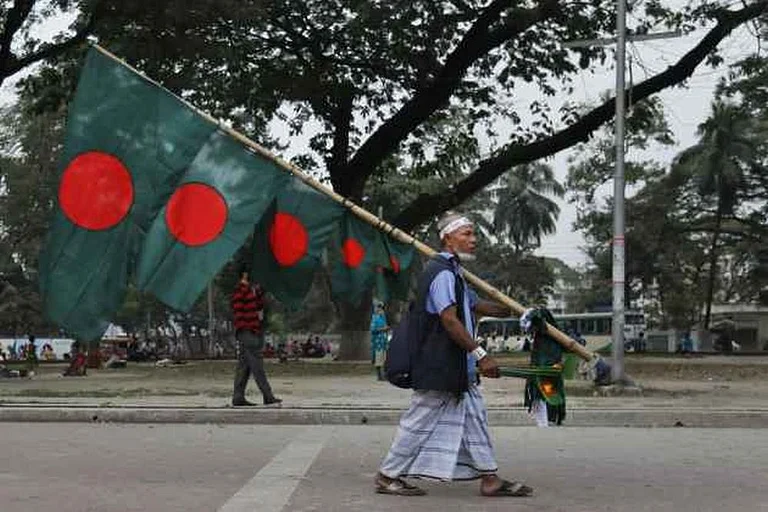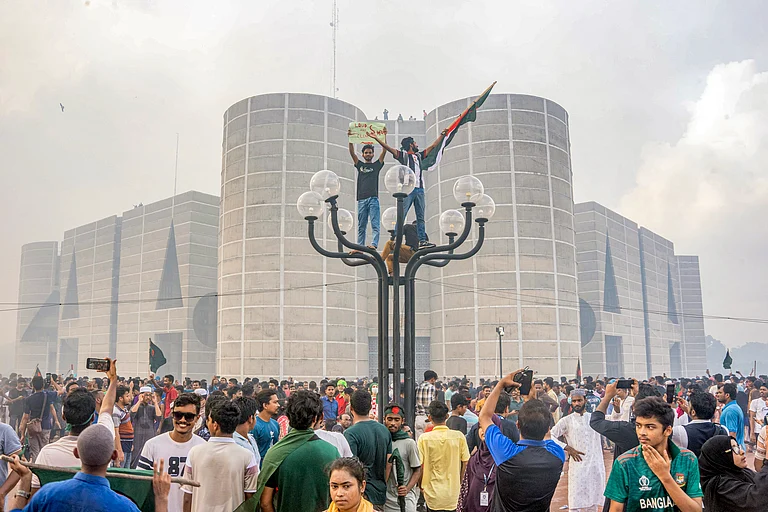A lot has changed in Bangladesh since the country’s longest-serving Prime Minister, Sheikh Hasina, resigned last week amid escalating protests. The unrest, which began in June over job quotas for kins of independence war veterans, escalated into widespread civil disorder demanding Hasina’s resignation. The government came down heavily on the protestors, with at least 280 deaths recorded, and thousands injured.
As the violence intensified, fearing for her safety, Sheikh Hasina fled Dhaka in a military aircraft on August 5 and has since sought refuge in Delhi. Outlook looks back at the events that have unfolded in Bangladesh since Hasina’s departure.
Sheikh Hasina seeks refuge in India
As Sheikh Hasina departed the country aboard a military helicopter, speculation swirled about her destination. While some reports suggested she was headed to the UK, others claimed she was en route to West Bengal or had already arrived in Agartala. It was later confirmed that she landed at Ghaziabad’s Hindon airbase and is now in Delhi.
Her destination remains uncertain as she considers asylum overseas. While the UK was initially considered a potential refuge, British Foreign Secretary David Lammy said a "full and independent UN-led investigation" into recent events in Bangladesh would have to be carried out, which may complicate her asylum prospects there. Other countries, including the US, Finland, UAE, and Saudi Arabia, are also being explored as potential options for her asylum.
In an interview with The Times of India, Sajeeb Wazed Joy, her son who lives in the US, said Sheikh Hasina will return to Bangladesh once the interim government decides to hold elections.

Protestors storm Sheikh Hasina’s residence, vandalise Mujibur Rahman’s statue
Just hours after Sheikh Hasina left the country, her official residence, Ganabhaban, was stormed by a mob of protesters. Photos and videos circulated on social media showed the youths defacing property, looting, and brandishing stolen personal items, including the former Prime Minister’s undergarments, sarees, television sets, and a Dior suitcase. Some individuals were photographed sitting at tables in Hasina's offices, rifling through files and documents, while others enjoyed biryani and other meals inside the palatial home. They vandalised and stole furniture, electronics, livestock, and gym equipment, and even set fire to some areas of the residence.
A mob also targeted the statue of Sheikh Mujibur Rahman, the country’s first President and Sheikh Hasina’s father, defacing and ultimately bringing it down. The protesters set fire to Sheikh Hasina’s political party, the Awami League’s office.
Military takes over
Army Chief General Waker-Uz-Zaman addressed the nation in a televised broadcast on August 5, announcing the formation of an interim government. General Waker-Uz-Zaman assured the public of the military’s commitment to achieving justice for those affected by the recent violence and urged citizens to embrace non-violent, peaceful methods of protest.
Political prisoners freed
President Mohammed Shahabuddin announced the dissolution of Bangladesh’s parliament hours after Sheikh Hasina’s resignation on August 5 and ordered the release of several high-profile political prisoners. Among those freed was Begum Khaleda Zia, the 78-year-old chair of the main opposition party – the Bangladesh Nationalist Party - who had been under house arrest after a 2018 conviction on corruption charges.
Additionally, opposition activist Ahmad Bin Quasem, the son of the executed Jamaat-e-Islami leader Mir Quasem Ali, and former brigadier-general Abdullahil Aman Azmi, who was abducted in 2016, were also released.
.jpg?w=801&auto=format%2Ccompress&fit=max&format=webp&dpr=1.0)
Muhammad Yunus sworn in
Nobel laureate Muhammad Yunus was sworn in as the head of Bangladesh’s interim government on August 8, just three days after Sheikh Hasina's resignation. Yunus, acclaimed for founding Grameen Bank and pioneering microloans, will lead a 14-member interim government focused on restoring peace and organising elections within 90 days (about 3 months). His appointment came after discussions between President Mohammed Shahabuddin, military leaders, and student representatives, who rejected a military-led government and were in favour of Yunus's leadership.
His cabinet includes Nahid Islam and Asif Mahmud, prominent student leaders who played a key role in the protests against Hasina. Yunus, a staunch critic of Hasina, faced over 100 criminal cases during her tenure.
Attacks on minorities
Violence against minorities has been on the rise in Bangladesh since Hasina’s ouster. Reports indicate that at least 205 attacks have targeted Hindu households, temples, and businesses across 52 districts. In response, the interim Cabinet has expressed grave concern and pledged to engage with representative bodies and groups concerned to address these attacks.
The United Nations has also condemned the violence, with Deputy Spokesperson Farhan Haq affirming the need to combat race-based attacks and highlighting the plight of the Hindu community, which constitutes nearly 8 per cent of Bangladesh's population. In the wake of the violence, hundreds of Hindus have protested in Dhaka and Khulna, demanding protection and justice.
.jpg?w=801&auto=format%2Ccompress&fit=max&format=webp&dpr=1.0)
Sheikh Hasina levels charges against US, as per reports
Sheikh Hasina, now in India, has alleged that the United States played a role in her ouster because it wanted control over Bangladesh's Saint Martin island in the Bay of Bengal, which she refused to concede, according to a report by The Economic Times.
According to report which cited Hasina’s close associates, Hasina said “I resigned to avoid witnessing the death toll that radicals sought to achieve through violence. They wanted to gain power over the dead bodies of students, but I did not allow that by stepping down. I could have stayed in power by surrendering Saint Martin Island’s sovereignty, allowing US control over the Bay of Bengal. I urge my fellow countrymen not to be misled by radicals,"
Sheikh Hasina’s son has Sajeeb Wazed has denied Sheikh Hasina as having accused US of having played a role in her ouster.
White House spokesperson Karine Jean-Pierre dismissed claims of US involvement in the events, stating, "We have had no involvement at all. Any reports or rumours that the United States government was involved in these events is simply false.”










.jpg?auto=format%2Ccompress&fit=max&format=webp&w=768&dpr=1.0)
















